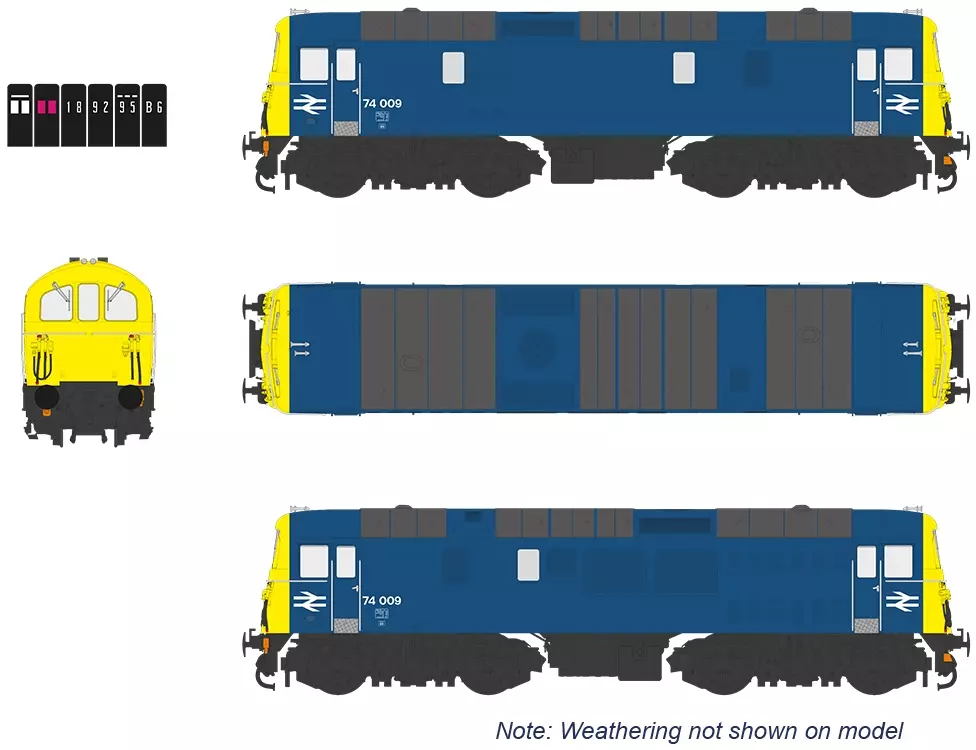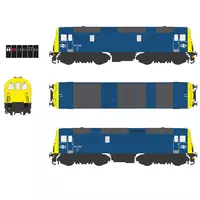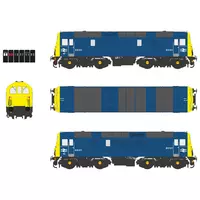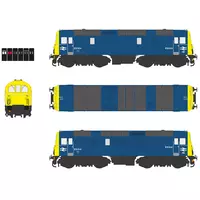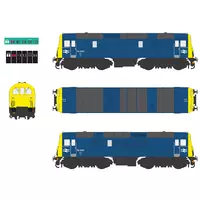Manufacturer catalogue image - please note that pre-release images may be CAD renders or CGI images rather than photographs
Prototype Era
Era 7 (1972 to 1982) British Rail Blue (TOPS)
Manufacturer description
The Class 74 Electro-Diesel Locomotive is the next new tooling model to be developed for the EFE Range and a subject that has never before been produced as a mainstream ready to run model in OO Scale.
This class of ten locomotives was creating by rebuilding redundant Class 71 Electrics and whilst they operated for little more than a decade at the most, their work was varied and spanned the early years of the popular BR Blue era making this new model a must for any Southern Region modeller depicting the period from the end of steam to the late-1970s.
The new EFE Rail model boasts a high level of detail and technical features. Powered by a high-quality coreless motor, drive is provided to both bogies and every axle, and electrical collection comes from every wheel. DCC provision comes by way of a 21 pin decoder socket whilst there is space for a speaker to be fitted. Cab lighting is available to both analogue and DCC users, along with illuminated blinds at each end, for which a selection of interchangeable route blinds are provided. The lighting features can be switched on/off via DCC, whilst analogue users can use the chassis-mounted switches to turn the cab lights on/off, and a second switch allows the illuminated blinds to be turned off at the trailing end. The models sport NEM coupling pockets and sprung buffers along with etched metal grilles, separate metal handrails and a full complement of cab end cables and bufferbeam pipework.
- EFE Rail OO Scale
- Era 7
- Weathered BR Blue livery
- Running No. 74009
- Equipped with a 21 Pin DCC Decoder Socket – recommended Decoder item No. 36-557A
- Length 205mm (over couplings)
EFE RAIL CLASS 74 ‘ELECTRO-DIESEL’ SPECIFICATION
MECHANISM:
- Coreless, twin shaft motor providing drive to both bogies
- All axle drive
- Electrical pickup from all wheels
- Separate metal bearings fitted to each axle
- Diecast metal chassis block
- Gearing arranged for prototypical running speeds and haulage capabilities
- 5mm (OO gauge) wheels to NEM310 & NEM311 standards with authentic profile and spoke detailing
- Close coupling mechanism fitted at either end, each of which is fitted with coupling pockets to NEM362 standards
- Designed to operate on curves of second radius (438mm) or greater
DETAILING:
- High fidelity injection-moulded bodyshell
- Bogies constructed from multiple components featuring full relief detail
- Separately applied detail parts, including lamp irons, metal handrails, etched grilles, cab-end jumper cables, windscreen wipers and whistles
- Sprung buffers
- Cab interior detailing including seats, control desk, controls and dials with authentic decoration
- Slide in destination blinds with a selection of routes, white and red blinds provided for user-fitment
- Each model supplied with a full set of decorated, model-specific bufferbeam pipework and accessory parts including bufferbeam skirt infill pieces to be used when the tension lock couplings are removed
LIGHTING:
- Illuminated headcode blinds, with the rear blinds turned on/off via a chassis-mounted switch on Analogue control. On DCC, headcode blinds can be switched on/off independently at either end via dedicated functions
- Cab lighting, switchable on/off via a chassis-mounted switch on Analogue control, or via dedicated functions on DCC
- Authentic light colours and temperatures selected for each model based on era and application
DCC:
- 21 Pin DCC decoder interface
SOUND:
- Space provided on the chassis for a speaker which can be connected to the main circuit board via the solder pads provided
LIVERY APPLICATION:
- Authentic liveries applied to all models
- Multiple paint applications employed on each model using BR specification colours
- Logos, numerals and text added as appropriate using multi-stage tampo printing using authentic typefaces, logos and colours
BR CLASS 74 HISTORY
The Class 74 Electro-Diesel Locomotives (known as ‘HB’s before the introduction of the Total Operations Processing System (TOPS)) began life as Class 71 Electric Locomotives (originally ‘HA’s) of which a fleet of 24 locomotives was built by British Railway’s Doncaster Works between 1958 and 1960. The original locomotives were used on the electrified lines of the Southern Region and were ordered for mixed traffic and could be found hauling high profile services like the ‘Night Ferry’ and ‘Golden Arrow’. Collecting power from third rail via collector shoes fitted to the bogies, the Class 71s also had roof-mounted pantographs to work in yards where overhead lines had been installed instead of using third rail – removing the danger of the live rail to workers operating nearby.
As more Electric Multiple Units (EMUs) arrived the Class 71s were displaced from their passenger duties and soon, the Class 73 Electro-Diesels – which could work ‘off-grid’ on non-electrified lines or if the electric supply was interrupted, during engineering works for example – took much of their freight work too, and by the mid-1960s, ten of the 24 locomotives had been placed in store.
Inspired by the success of the Class 73s, a plan was devised to rebuild the stored Class 71s and so they were taken to Crewe Works where they would be converted to create the Class 74s. Like the Class 73s, these new locomotives were fitted with a diesel engine allowing them to work away from electrified lines. They retained their bogie pickups to collect power from third rails, however the pantographs were removed. At each end, buckeye couplings, buffing plates and high-level control and brake pipes were fitted to facilitate working with other stock fitted with electro-pneumatic brakes. Returning to service between November 1967 and May 1968, all ten Class 74s entered traffic in BR Blue livery with full yellow ends and were numbered E6101 – E6110, becoming Nos. 74001 – 74010 when they were renumbered under TOPS.
Being able to work on non-electrified lines, including those around harbours and within goods yards, one of the main duties envisaged for the Class 74s was working the boat trains to Southampton and Weymouth which had previously necessitated locomotive changes at Eastleigh and Bournemouth respectively to work the final part of the journey. In practice however, the reliability of the diesel engines meant that the Class 74s were often swapped for Class 33s at Bournemouth for the final leg to Weymouth, although those working to Southampton generally persevered as this involved running on only a short section on non-electrified line where the diesel engine would be called upon.
In addition to their work on the boat trains, the Class 74s were employed as mixed traffic locomotives and saw regular use on passenger trains until 1973/1974 when more 4-REP EMUs were introduced to work Waterloo to Weymouth services. They also regularly hauled night mail and newspaper trains, and were sometimes called upon for other passenger, parcels and freight workings.
Almost a decade after they entered traffic, the entire fleet of ten locomotives had been withdrawn as the curtain fell on Class 74 workings in December 1977. Their demise can be attributed to the poor reliability of the diesel engine and electrical systems and whilst the latter could have been upgraded, like the Class 71s from which they were converted much of their work no longer existed as boat trains had reduced in number and those that remained were now worked by multiple units, and freight and parcels traffic had also reduced. All ten locomotives were scrapped, the last No. 74005 being cut in January 1981.
Catalogue listing
Model details
Prototype information
* Class names often change over the lifespan of a locomotive, so this is not necessarily the class name used by the operator in the period modelled.
Supplier links are provided for your convenience and do not guarantee that the product is currently available. RailwayModels.uk is not a representative of these suppliers, but may receive a commission when purchases are made through links on this page.
